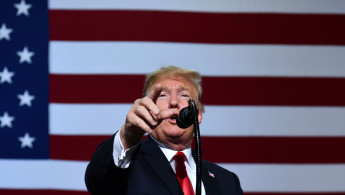US forces to deploy in Saudi Arabia, Gulf: report
"Saudi Arabia and the rest of GCC states do not wish to start a war with Iran, but they want to send a strong message to Tehran that it cannot cross the red line by continuing to provoke forces operating in the Arabian Gulf," sources told Asharq Al-Awsat on Friday.
The redeployment of forces was approved based on "bilateral agreement" to protect energy supply and "prevent Iran from disrupting maritime traffic in that region", the report said, quoting the sources.
The New Arab has contacted the US Central Command which oversees US troops in the region for comment.
Last week, President Donald Trump rejected a report that he is considering sending 120,000 troops to counter Iran, but didn't rule out deploying "a hell of a lot more" soldiers in the future.
"I think it's fake news," Trump said of a New York Times report that the White House is considering a plan to send 120,000 troops to the region as part of a tightening pressure campaign against the Iranian government.
"Now, would I do that? Absolutely. But we have not planned for that," Trump told reporters. "Hopefully we're not going to have to plan for that. If we did that, we'd send a hell of a lot more troops than that."
According to the Times report, the 120,0000 troops under consideration would not be used to invade Iran, something that planners say would require much bigger numbers.
But such a huge deployment would reverse Trump's push throughout his presidency to reduce the US military presence abroad and to wind down what he says have been failed wars in the region.
Despite that stance, his government has taken an increasingly hard line with Iran, a longtime foe of the United States and key US allies Israel and Saudi Arabia.
The latest report comes amid soaring tensions in the region between Iran and the United States.
The stand-off had been simmering since the United States last year withdrew from the 2015 nuclear treaty which Iran reached with major world powers.
In recent days the US accused Iran of alleged threats and last week deployed an aircraft carrier group and B-52 bombers to the Gulf.
Iran had not made any direct public threats to spark the US deployment, but Washington says it acted on intelligence reports of Iranian actions.
On Friday, the deputy head of Iran's elite Revolutionary Guards said Iranian missiles can reach US warships in the Gulf, as tensions continued to rise between Washington and Tehran.
"Even our short-range missiles can easily reach (US) warships in the Persian Gulf," Mohammad Saleh Jokar, the Revolutionary Guard's deputy for parliamentary affairs, said, according to the semi-official Fars news agency.
"America cannot afford the costs of a new war, and the country is in a bad situation in terms of manpower and social conditions," he added.
Iran has accused the United States of "psychological warfare" over the build-up of military forces, with foreign minister Javad Zarif saying there is "no possibility" of negotiations with the United States to reduce spiralling tensions.
Amid escalating tensions in the region, Zarif has called on the international community to save the nuclear deal, known as the Joint Comprehensive Plan of Action, or JCPOA.
Iran signed the deal with China, Russia, Germany, Britain, France and the United States. International sanctions were eased in return for curbs on Tehran's nuclear programme.
But last year President Donald Trump walked away from the accord. The US has since then slapped sweeping sanctions on Iran.
Follow us on Twitter: @The_NewArab





 Follow the Middle East's top stories in English at The New Arab on Google News
Follow the Middle East's top stories in English at The New Arab on Google News
![The UAE is widely suspected of arming the RSF militia [Getty]](/sites/default/files/styles/image_330x185/public/2024-11/GettyImages-472529908.jpg?h=69f2b9d0&itok=Yauw3YTG)
![Netanyahu furiously denounced the ICC [Getty]](/sites/default/files/styles/image_330x185/public/2024-11/GettyImages-2169352575.jpg?h=199d8c1f&itok=-vRiruf5)
![Both Hamas and the Palestinian Authority welcomed the ICC arrest warrants [Getty]](/sites/default/files/styles/image_330x185/public/2024-11/GettyImages-2178351173.jpg?h=199d8c1f&itok=TV858iVg)